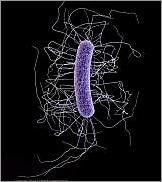
A major paper just published in Cell Host & Microbe sheds light on a question that has puzzled scientists for years: while we know fecal microbiota transplantation (FMT) works for people suffering from recurrent Clostridium difficile infection, how exactly does it work? The research team behind the paper includes Alexander Khoruts and Michael J. Sadowsky, the director of the Biotechnology Institute, a Consortium member center. They used clinical experiments and statistical modeling to uncover the "rules" for how donor bacteria grafts itself to existing gut microbes in the host. One of the outcomes of the research is Strain Finder, a method to predict which types of bacteria will best colonize a microbiome being treated via FMT. An article in the Star Tribune further describes the work of Sadowsky and Khoruts’ Microbiota Therapeutics Program, which is on the cutting edge of developing remedies for various microbiome-related illnesses. You can also read a Star Tribune op ed by Khoruts and Sadowsky, in which they express their concerns about the article's focus on a for-profit model for developing such therapies.